Bay City Rollers: The boy band that turned the world tartan
- Published
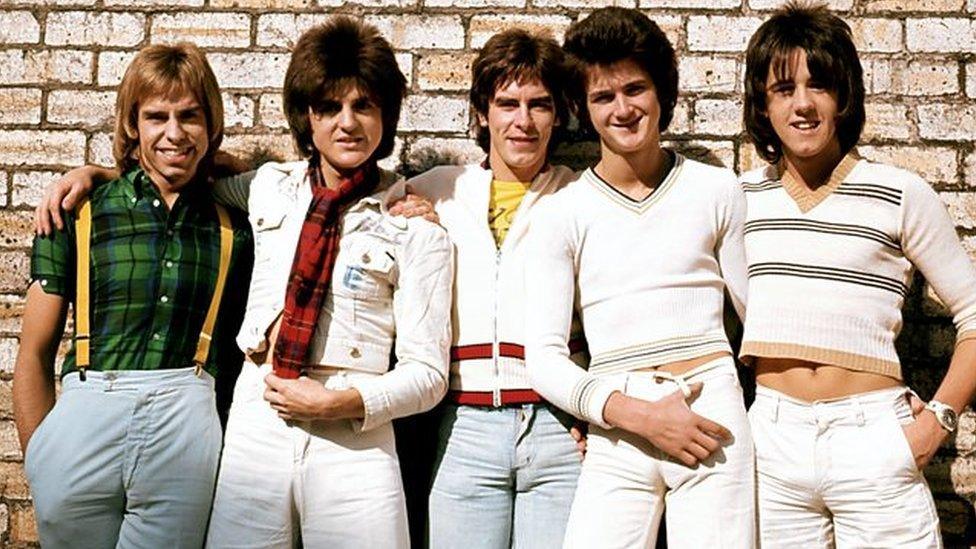
The classic Bay City Rollers line-up was Derek Longmuir, Eric Faulkner, Alan Longmuir, Les McKeown and Stuart Wood
Forty years ago this week, the Bay City Rollers were the biggest pop band in the UK and were about to the hit the United States, as the Scottish teen sensations rolled on towards turning the whole world tartan.
"They were adorable. Five cute guys at once. That's the story of rock n roll," says US journalist Danny Fields.
"The invention of boy bands became an industry thanks to the Bay City Rollers."
As the editor of 16, an influential American teen magazine, Fields was part of a press junket to Scotland in the summer of 1975 to witness the phenomenon that was driving teenage girls in the UK wild.
Fields says watching the scenes on the streets of Glasgow was like witnessing the triumphant return of conquering heroes in an epic movie.
"It was like Ben Hur except it was all these girls wearing ugly pants," he told the BBC Scotland documentary Rollermania: The Biggest boy band in the world.
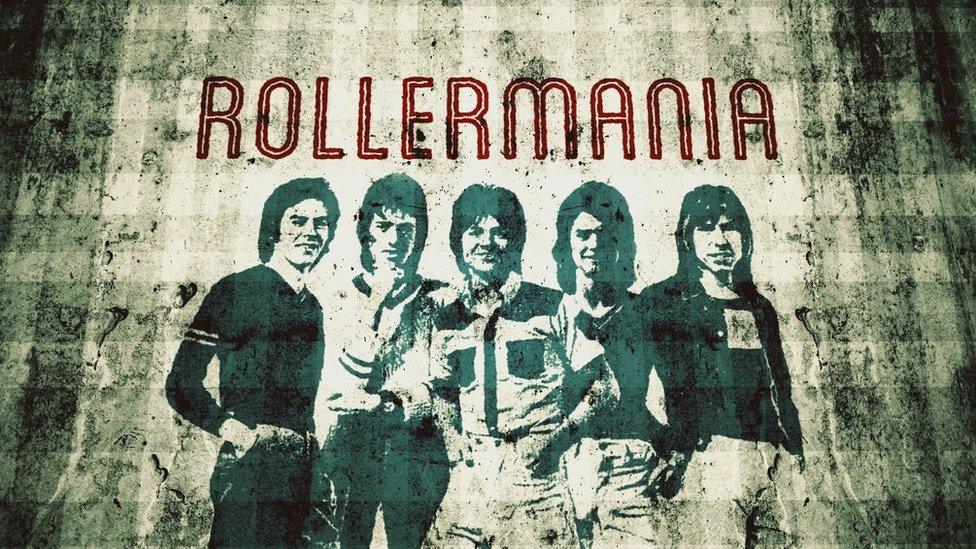
Music publicist Carol Strauss Klenfner, who organised the press trip, says: "It was just crazy, 12-year-olds and 14-year-olds all dressed up in Roller garb, with that look in their eye, of love. It was young love personified.
"They were so young and so fresh-faced. They were these wonderful Scottish fair complexions with rosy cheeks. They were wild-eyed and they could sure scream loud."
Fields and Strauss Klenfner were witnessing the high-point of Rollermania in the UK, with number one singles, sell-outs tours, the band's own TV show and thousands of hysterical tartan-clad teenage fans screaming at them wherever they went.
But getting to that point had not been easy.
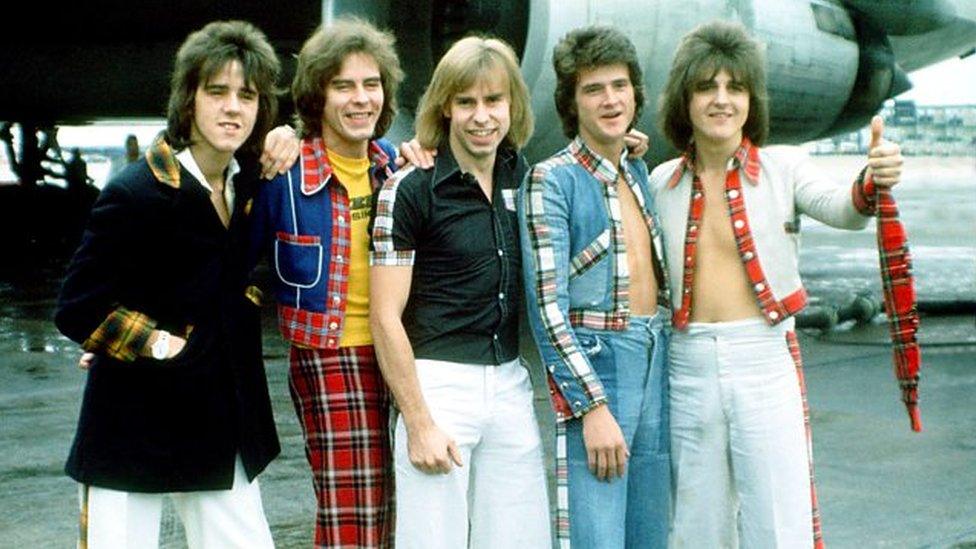
It had been nine years since two Edinburgh brothers - Alan and Derek Longmuir - had formed a band with their school mates.
The Saxons decided they wanted a more American-sounding name and stuck a pin in a map of the US, landing in Bay City, Michigan.
Personnel changes and the arrival of local pop promoter Tam Paton as their manager drove the band on as they gathered a loyal following around Edinburgh.
By 1971, Paton had landed the Rollers a deal with Bell records and they had a hit single, "Keep on Dancing", which crept up the charts to number nine.
False dawn
Alan Longmuir says: "It was brilliant. We were just young guys. I was a plumber to-trade, my brother was a joiner, Nobby, the singer, was a joiner."
But it was a false dawn and their next two singles failed to make the charts.
Paton made changes to the line-up and to the band's look but by the end of 1972 the Rollers were starting to look like a one-hit wonder.
Bell Records brought in hit-makers Phil Coulter and Bill Martin, who had written Britain's first Eurovision Song Contest winner, Puppet on a String, for Sandy Shaw in 1967.
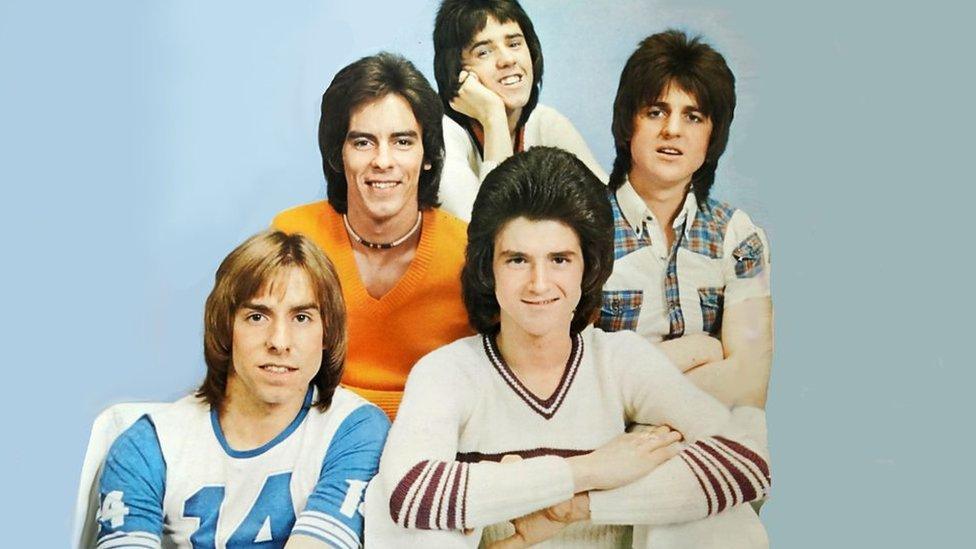
Martin, who was from Govan, says: "I was always looking for a Scottish band and I thought they were quite special. Quite different from any other pop group."
Coulter was impressed by the band's "unshakeable" belief they would be superstars but he says the reality was they could hardly tune their own guitars.
He insisted session musicians were used to lay down the tracks in the studio because it would take too long to get the right sound from the band.
As they worked on the new sound, there were more changes in the band's line-up with Les McKeown brought in to replace Nobby Clark as the lead singer.
Another new face was 16-year-old Stuart Wood.
He says: "I was gobsmacked. I'd only been playing guitar just over a year and probably knew about five or six chords."
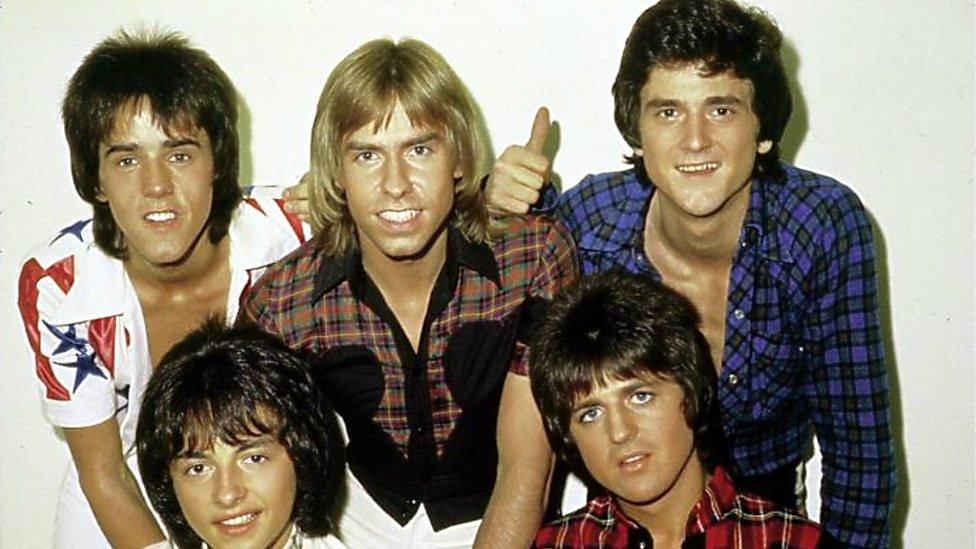
The band's membership started to change as the strain of their success showed
With the classic line-up in place, and Bill and Phil on board, the hits began to come.
Remember (Sha La La La) got to number six in early 1974 but it was Shang-a-Lang that kick-started Rollermania.
Producer Bill Martin says: "It was phenomenal. It just took off like a rocket."
Stuart Wood says: "From not having anyone screaming to having thousands of people screaming at you was pretty quick."
"The noise was colossal," says Martin. "They were a sensation."
According to Coulter the big difference was the age of the girls buying the records and screaming at the band.
They were not 16 or 17 but instead were much younger.
"This was whole new thing," he says. "That was the gap in the market."
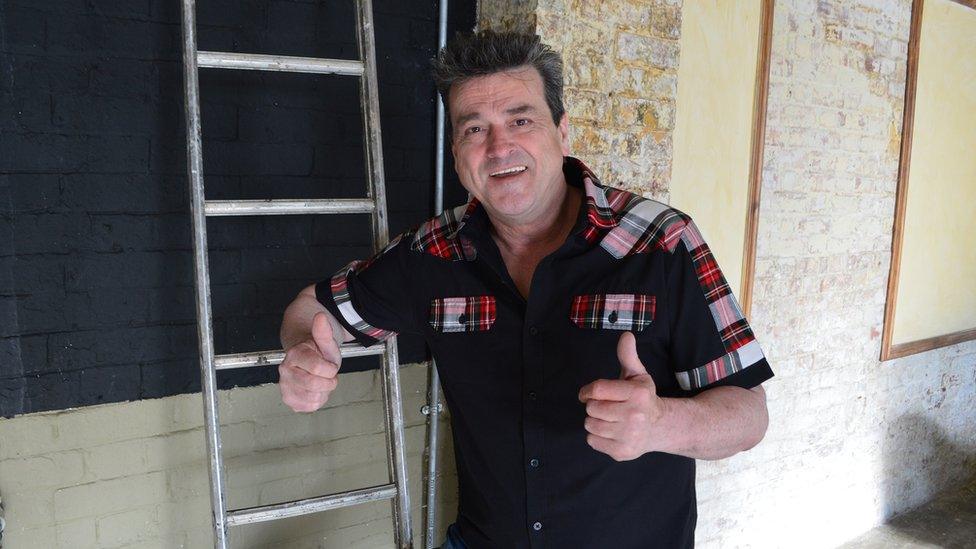
Les McKeown says the police would stop concerts because they could not control the crowd
At the end of 1974, their debut album - Rolling - was at number one but the Rollers were not happy.
Coulter says the band wanted to be more hands-on, writing their songs and playing on their own tracks.
He refused and the band demanded a new producer.
Phil Wainman was given the task of keeping the hits coming but the Rollers had to play and sing on the records.
"That was quite a task," he says.
But it was one he was equal to and in early 1975 Bye Bye Baby went to number one and stayed there for six weeks.
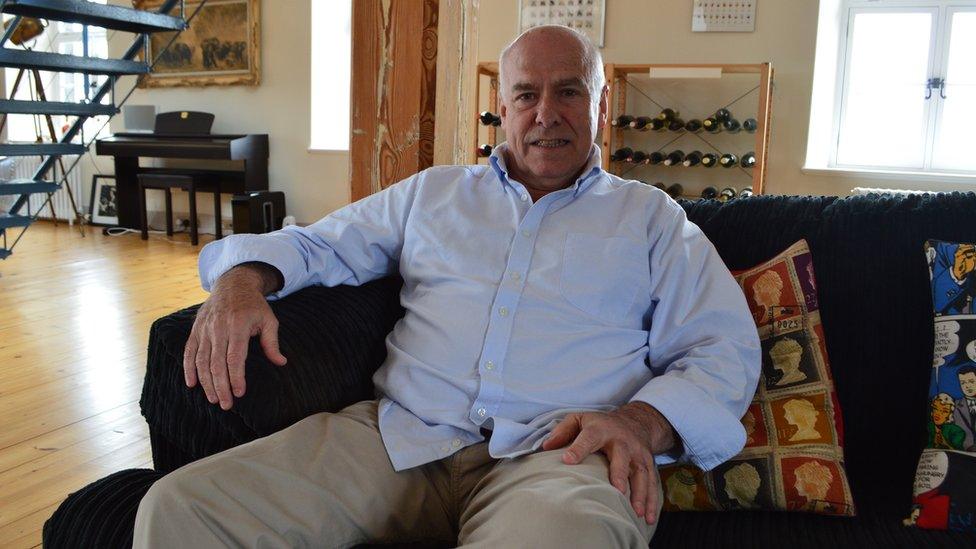
Derek Longmuir says the band were ripped off and made very little money
Wainman says: "It was selling 75,000 a day. You can have a hit these days with just 20,000 records."
The next single "Give a little love" also went to number one and Rollermania took over the country.
The band even had their own TV show.
At the height of the mania the Rollers undertook their biggest UK tour to-date.
"That was a crazy tour," says McKeown.
"We would go on and the police would make us stop because they just could not control the crowd."
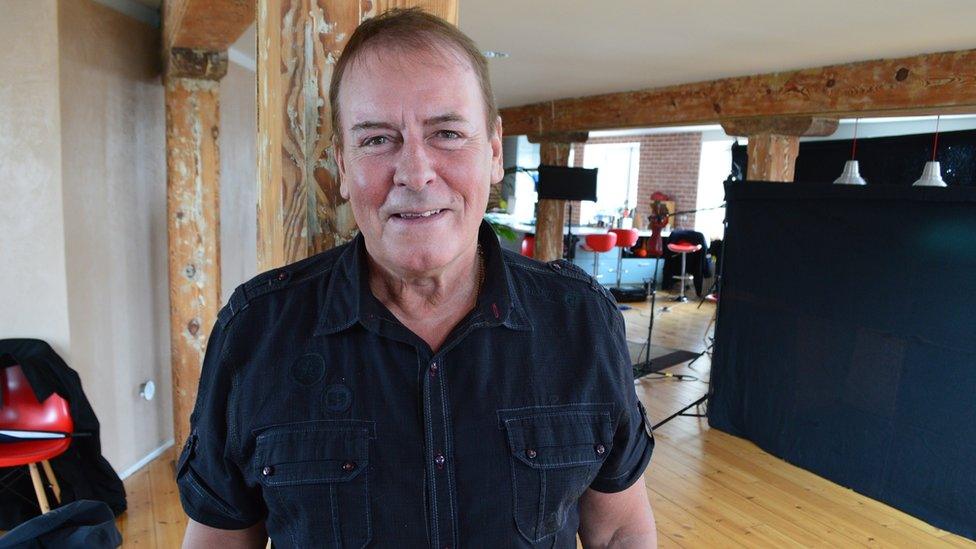
Founder member Alan Longmuir left the band at the height of their success
The strain of constant touring was compounded when, on a rare visit home to Edinburgh, McKeown ran over and killed a 76-year-old woman.
He says: "I can remember just being in complete shock. I don't know how long it took me to come out of that shock.
"In retrospect I should have dealt with the issue in a much more comprehensive way."
The day after the accident McKeown rejoined the tour.
Stage invasion
The Rollers management had no time to give McKeown a chance to deal with the incident, they were already planning the next stage of their global domination by breaking them in America.
Music mogul Clive Davis of Arista Records picked "Saturday Night" as their first single in the US, a Bill and Phil production that had failed to chart in the UK in 1973.
On 20 September 1975, the Rollers performed at London Weekend Television and were beamed by satellite into the homes of 30 million unsuspecting Americans.
Their performance ended with a stage invasion that left Woody and Les in hospital.
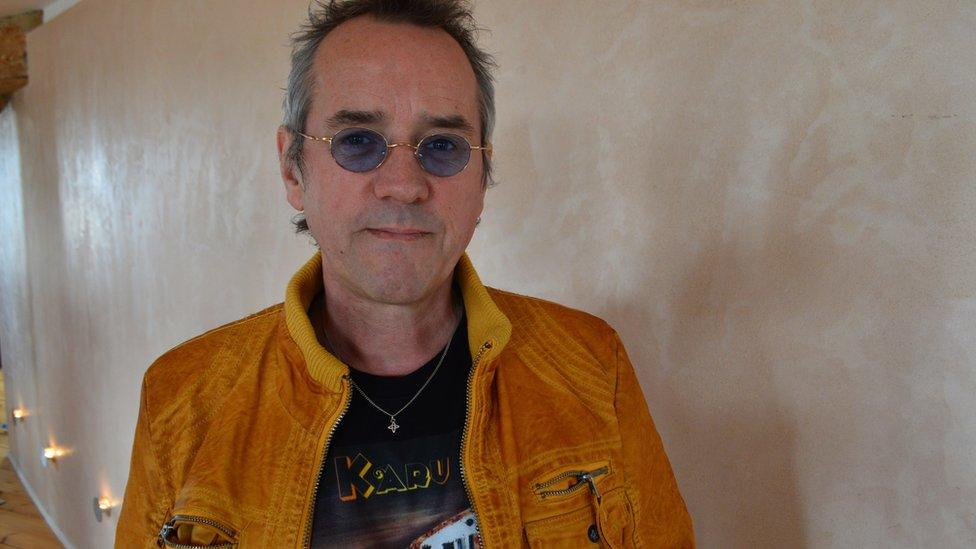
Stuart Wood joined the band as a 16-year-old in 1974
Ten days later the Rollers were on their way to America.
Details of their flight arrival were leaked to fans so they got a rapturous reception as they touched down.
Phil Wainman says: "I went out there and witnessed this unbelievable happening at JFK.
"It was like the Beatles all over again. In fact it might have been bigger."
By January 1976, Saturday Night had climbed to the top of the US Billboard chart.
According to Bill Martin it sold 12 million records.
Despite success around the world, the cracks were showing and founder member Alan Longmuir quit the band in April 1976.
He says: "I was getting depressed. I just couldn't take it any more."
New members came and went and the hits started to slow.
Ripped off
The band sold 120 million records and conquered the UK, US, Australia and Japan but music journalist Caroline Sullivan says that by late 1977 they had declined in popularity quite a bit.
"There is obviously a sell-by date for all boy bands and the Rollers were reaching theirs.
"They had a really good run. The fans were growing up and The Rollers themselves were obviously completely fed up with it."
The band finally imploded when McKeown left in 1978 and bitter battles over the money they should have been paid dragged on for years.
Derek Longmuir says: "We were definitely ripped off but there was a big element of naivety as well.
"People would come along and tell you, 'you guys just concentrate on the music and we'll do the business stuff' and you just accepted that."
Bill Martin says: "I have no qualms about saying about Tam Paton that he was a disgrace. He deserved to die a broken man because those wee boys should have had everything."
Rollermania: Britain's biggest boy band is on BBC One Scotland at 21:00 on Monday 14 September.